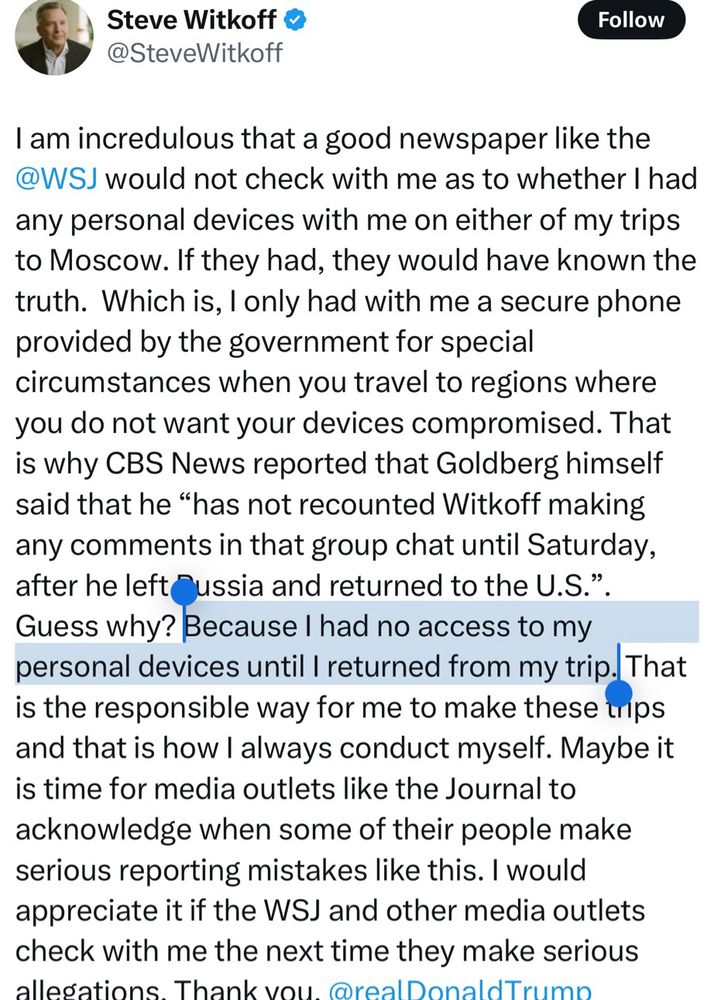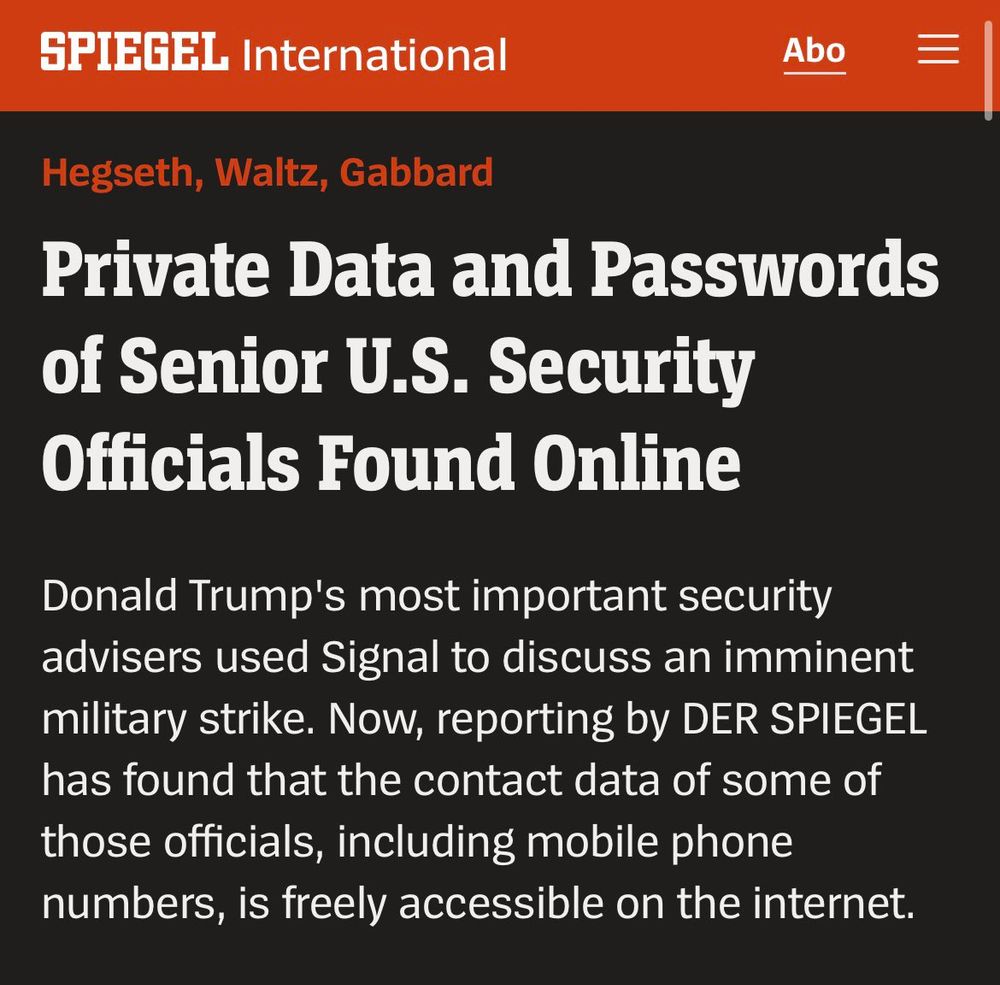Houthi group chat: What top Trump officials claimed vs. what the texts show
Dave Lawler
The Atlantic has called the Trump administration's bluff, publishing in full the Signal messages about an upcoming attack on the Houthis in Yemen that were inadvertently sent to the magazine's editor-in-chief, Jeffrey Goldberg.
Why it matters: The country's top national security figures argued Goldberg was overhyping the scale of the intelligence breach, and claimed no classified information or "war plans" were shared. Now, the texts are available to the public.
How it happened: After Goldberg published a partial version of the texts, withholding key details for national security reasons, national security adviser Mike Waltz and Defense Secretary Pete Hegseth swiftly went into shoot-the-messenger mode.
They both attacked Goldberg's integrity and vehemently denied that any war plans were shared, while Waltz even suggested Goldberg may have gained access to the chat through some kind of subterfuge.
White House press secretary Karoline Leavitt echoed those claims, calling Goldberg a "sensationalist." (She also later objected to the release of the full text chain, per Goldberg.)
Intelligence director Tulsi Gabbard and CIA Director John Ratcliffe testified on Tuesday that, to their knowledge, no classified information or details about operational planning were shared over Signal.
Here's how those statements match with what we learned in the subsequent Atlantic story.
"No war plans"
Hegseth: "Nobody was texting war plans."
From the texts: "THIS IS WHEN THE FIRST BOMBS WILL DEFINITELY DROP," Hegseth texted, along with detailed sequencing of the operation.
State of play: Trump administration officials pointed to The Atlantic's use of "attack plans" in its new headline to accuse the magazine of walking back its initial claims about "war plans."
There is a distinction in military parlance: "War plans" are typically more comprehensive, strategic frameworks that account for multiple scenarios, while "attack plans" usually pertain to a specific tactical operation.
Hegseth mocked the "war plans" characterization: "No names. No targets. No locations. No units. No routes. No sources. No methods."
Critics say the White House is arguing over semantics, when the fact is plans for a forthcoming military operation were indeed shared on a non-classified system without actually verifying who was receiving them.
Goldberg got "sucked into" the group
Waltz to Fox News: "I'm not a conspiracy theorist, but of all the people out there, somehow this guy ... gets on somebody's contact and then get sucked into this group. ... Now, whether he did it deliberately or it happened in some other technical mean is something we're trying to figure out."
The text screenshots from Goldberg's device show a Signal notification that reads: "Michael Waltz added you to the group."
State of play: Waltz has said an investigation is underway, while Goldberg has said his assumption is Waltz himself added him by accident.
"No classified info"
Gabbard under oath to the Senate Intelligence Committee: "I can attest to the fact that there were not classified or intelligence equities that were included in that chat group at any time."
Ratcliffe concurred, though both officials later deferred to Hegseth as the ultimate authority for classifying and declassifying Defense Department materials.
The texts include highly detailed information about the sequencing of an attack that had yet to take place.
Under intelligence community guidelines, information "providing indication or advance warning that the U.S. or its allies are preparing an attack" should be treated as "Top Secret."
State of play: The president and senior officials like the secretary of defense have considerable discretion over what information is classified, and whether to declassify it after the fact.
But Gabbard and Ratcliffe declined to offer any explanation in the hearing as to why this information would not have been considered classified at the time it was inadvertently shared with Goldberg.
No "weapons packages, targets or timing"
Ratcliffe in the Senate hearing said he was not "aware" of any "information on weapons packages, targets or timing" that was discussed in the chat. Gabbard concurred.
The texts include a detailed sequencing of the timing of the attacks, to include Hegseth's to-the-minute breakdown of when F-18s and drones would take off and drop their payloads.
Hegseth even mentioned the precise minute that the window for striking the primary target's known location would open. He also mentioned at least one weapons package: sea-based Tomahawk missiles.
State of play: Waltz has emphasized that no "sources or methods" were exposed — shorthand for information that could put U.S. intelligence assets or information gathering at risk.
It's also the case that the texts didn't include, say, the specific coordinates for strikes. But they do clearly refer to specific timings and, in a more general sense, to weapons packages and targets.
One text in particular where Waltz refers to the primary target "walking into his girlfriend's building" could potentially have shed light on U.S. intelligence collection methods.
Not a "huge mistake"
Ratcliffe answered "no" when asked if the entire Signal saga had been a "huge mistake." President Trump and others have also downplayed the significance of the breach.
The texts did not leak until after the operation has concluded, likely limiting any harm to national security. But there's a reason Goldberg's accidental inclusion on the chain has dominated the news cycle this week.
Key quote: "The U.S. secretary of defense texted a group that included a phone number unknown to him—Goldberg's cellphone—at 11:44 a.m. This was 31 minutes before the first U.S. warplanes launched, and two hours and one minute before the beginning of a period in which a primary target, the Houthi 'Target Terrorist,' was expected to be killed by these American aircraft," Goldberg writes.
"If this text had been received by someone hostile to American interests—or someone merely indiscreet, and with access to social media—the Houthis would have had time to prepare for what was meant to be a surprise attack on their strongholds. The consequences for American pilots could have been catastrophic."
President Trump's national security adviser accidentally invited the editor-in-chief of The Atlantic to a group text in which top officials debated highly sensitive plans for bombing Yemen, the magazine reported Monday.
Why it matters: The extraordinary breach exposed classified information and private deliberations among the highest-ranking officials in the U.S. government, and raised serious questions about the lax handling of America's secrets by Trump's Cabinet.
Avery Lotz
Updated 6 hours ago -
Politics & Policy
The Atlantic publishes more Signal messages after Trump admin denials
The Atlantic on Wednesday published additional messages Trump administration officials sent in a Signal group chat that inadvertently included the magazine's editor-in-chief Jeffrey Goldberg.
Why it matters: President Trump, Defense Secretary Pete Hegseth and other administration officials strongly denied that "war plans" and "classified materials" were shared — essentially daring The Atlantic to publish info it had previously opted not to release.
The newly disclosed messages include a text from Hegseth with specific times and sequencing of planned U.S. strikes against Houthi rebels in Yemen.
The texts and group chat member list released Wednesday do not include the name of CIA director John Ratcliffe's chief of staff at the request of a CIA spokesperson but are otherwise unredacted.
The other side: White House spokesperson Taylor Budowich slammed The Atlantic as "scumbags" in a response posted to X, saying that the publication had "abandoned their bulls**t 'war plans' narrative," highlighting that the new story refers to "attack plans."
White House press secretary Karoline Leavitt echoed that argument, contending in a statement: "The Atlantic has conceded: these were NOT 'war plans.'"
"No locations. No sources & methods. NO WAR PLANS," National Security Advisor Michael Waltz posted Wednesday.
Driving the news: The early discussion Goldberg observed in the conversation titled "Houthi PC small group" concerned the timing and reasoning behind the strikes (and an airing of grievances about the country's European allies).
But on the day of the attack — Saturday, March 15 — "the discussion veered toward the operational," Goldberg and staff writer Shane Harris noted.
The details: At 11:44am ET, Hegseth shared a "TEAM UPDATE" that included specific timing for the launch of U.S. warplanes and the sequencing of strikes.
Included in the breakdown of the strikes Hegseth detailed was the timing of when the "Target Terrorist" would be in his "Known Location" and "WHEN THE FIRST BOMBS WILL DEFINITELY DROP."
After sending the timeline, Hegseth wrote, "We are currently clean on OPSEC" — operations security — in a chat that inadvertently contained a journalist.
Vice President Vance responded, "I will say a prayer for victory."
Waltz — who first invited Goldberg to the chat — later told the group, in previously undisclosed messages, that a target building had collapsed.
U.S. intelligence had received "positive ID" of "the first target" walking into "his girlfriend's building," which had collapsed, Waltz wrote.
"Excellent," Vance responded.
Waltz replied with a fist, flag and fire emoji (



) — a trio that has been repeatedly memed in the wake of the fiasco.
Catch up quick: Goldberg, in his initial story, said he would not release the specific attack details Hegseth and Waltz shared to him and other group members, noting that if the plans were obtained by an adversary, they "could conceivably have been used to harm American military and intelligence personnel."
But as Democratic lawmakers and reporters pressed administration officials over the alleged leak of sensitive information, members of the chat remained defiant — despite the White House National Security Council confirming the chat's apparent authenticity.
Hegseth lashed out at Goldberg on Monday in response to the explosive reporting, characterizing him as a "deceitful and highly discredited so-called 'journalist' who's made a profession of peddling hoaxes time and time again."
Director of National Intelligence Tulsi Gabbard and Ratcliffe testified that there were no specific targets or weapons systems discussed in the Signal chat before a Senate panel Tuesday.
The bottom line: Those and other statements disputing the facts of Goldberg's story led "us to believe that people should see the texts in order to reach their own conclusions," Goldberg and Harris wrote.
Editor's note: This is a breaking news story. Check back for updates.
https://www.axios.com/2025/03/26/atlant ... lans-yemen


